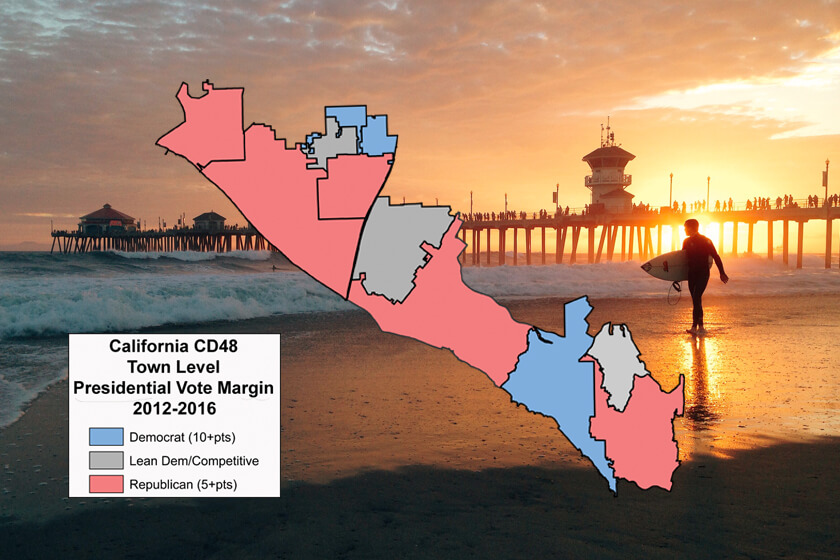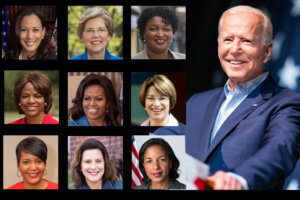West Long Branch, NJ – The race for California’s 48th Congressional District between Republican incumbent Dana Rohrabacher and Democratic challenger Harley Rouda is virtually tied according to the Monmouth University Poll. Although Republicans have a natural registration advantage in this Orange County district, higher Democratic enthusiasm and divided voter opinion on Rohrabacher are making this a competitive race. Democrats are slightly more satisfied than Republicans with the person who emerged from the June primary as their party’s nominee.
Rouda registers 46% support and Rohrabacher has the backing of 43% among all potential voters – that is voters who have participated in an election since 2010 or have newly registered to vote (a group that represents about 89% of all registered voters in the district). The state of the race does not change much when applying two different likely voter models. A historical midterm model shows the race at 47% for Rouda and 45% for Rohrabacher, while a model that includes a turnout surge in Democratic precincts gives Rouda a statistically insignificant 48% to 44% edge.
Rohrabacher has consistently won the district by double digits, but higher levels of enthusiasm among Democratic voters are making this year’s contest close. Overall, 60% of CA-48 voters say they have a lot of interest in the House race, but Democrats (75%) are more likely to report this level of interest when compared with Republicans (56%) and independents (54%). At this early stage of the race, Rouda has more widespread support among his fellow Democrats (95% to 2% for the incumbent) than Rohrabacher has among Republicans (85% to 5% for the challenger). Independents prefer Rouda (49%) over Rohrabacher (31%) by a wide margin.
Rohrabacher has a strong 55% to 34% lead among white voters without a college degree, while the race is basically tied among college educated white voters at 46% for Rohrabacher and 45% for Rouda. The Democrat, on the other hand, has a sizable 57% to 30% advantage among Asian, Latino, and black voters, who make up about one-third of the electorate in this district.
“Rohrabacher came into this race with a target on his back that included some opposition within his own party. He retains strong support in GOP strongholds centered around Newport Beach, but voters in the rest of the district are willing to look at someone new,” said Patrick Murray, director of the independent Monmouth University Polling Institute. He added, “Minority voters tend to show less interest in the election at this point, so a key for Rouda is motivating this part of his base to turn out.”
There is some question about how strong each of these candidates may be coming out of a hotly contested primary. Voter opinion is split on the incumbent who was first elected to Congress in 1988 – 32% have a favorable view of Rohrabacher, 33% have an unfavorable view and 34% express no opinion. About one-third of CA-48 voters (32%) say Rohrabacher’s political views are in line with most residents of the district, while 16% say they are out of step. Most voters (52%), though, are not sure how the incumbent’s views align with his constituents. [Note: nearly all the interviews for this poll were conducted before Rohrabacher’s appearance on Sacha Baron Cohen’s new satire show aired.]
Businessman Rouda is not as well known, having a 27% favorable and 13% unfavorable rating, with 60% expressing no opinion. Similarly, most voters (68%) do not know how Rouda’s political views align with the district, while 15% say they are in line with most residents and 17% say they are out of step.
Both candidates faced challenges from within their respective parties to become the two contenders on November’s ballot. Rohrabacher, who has attracted controversy for his comments on a number of issues, was the top vote-getter in last month’s crowded primary with 30% of the overall vote – but this was the worst showing among all House incumbents in California. On the Democratic side, Rouda was supported by the national Democratic Congressional Campaign Committee, but barely squeaked by another contender who had the backing of the state Democratic Party organization in a contentious race.
Looking at the aftermath of this primary, the Monmouth University Poll finds that 58% of self-identified Republicans and Republican-leaning voters are satisfied with Rohrabacher as the GOP nominee, but a sizable 24% wish that someone else was representing their party. On the Democratic side, a somewhat higher 66% of partisans are satisfied with Rouda as their nominee while just 10% wish it was someone else.
“Partisan voters are basically satisfied with their standard bearers in this race. But the fact that GOP voters are slightly less content with Rohrabacher could be decisive if this race is ultimately decided by a few thousand votes,” said Murray.
Despite the GOP registration advantage in this district, voter opinion is split on the job Donald Trump is doing as president – 46% approve and 49% disapprove. About 3-in-10 voters (29%) say Rohrabacher has given Trump the right amount of support, while 26% say the congressman has been too supportive and 10% say he has not been supportive enough. Two-thirds (67%) say it is very important for them to cast a vote for Congress that shows how they feel about the president. Opponents of Trump (76%) are somewhat more likely than his supporters (67%) to feel this way.
CA-48 voters are divided on the GOP’s recently enacted changes to the federal tax code, an issue which could resonate in one of the wealthiest districts in the country. Overall, 41% approve and 39% disapprove of the new tax reforms. They are also split on the potential impact to their own pocketbooks, with 27% expecting that their federal tax bill will increase and 26% saying it will decrease. Another 33% expect their tax bill to remain unchanged because of these reforms and 14% are unsure of the reforms’ impact on them personally.
The poll also finds that district voters are split on whether they prefer to have Republicans (42%) or Democrats (41%) in control of Congress, with 15% saying party control does not matter to them. It is worth noting that this finding comes from a district where the GOP has an 11 point voter registration advantage.
The Monmouth University Poll was conducted by telephone from July 11 to 15, 2018 with 402 voters in California’s 48th Congressional District. The question results in this release have a margin of error of +/- 4.9 percentage points for the full sample and +/- 5.2 percentage points for the likely voter models. The error of the gap between the two candidates’ vote share (i.e. the margin of the “lead”) is +/-6.9 percentage points for the full sample and +/- 7.3 percentage points for the likely voter models. The poll was conducted by the Monmouth University Polling Institute in West Long Branch, NJ.
QUESTIONS AND RESULTS
(* Some columns may not add to 100% due to rounding.)
1/2. If the election for U.S. House of Representatives in your district was today, would you vote for Dana Rohrabacher the Republican or Harley Rouda the Democrat? [IF UNDECIDED: If you had to vote for one of the following at this moment, do you lean more toward Dana Rohrabacher or more toward Harley Rouda?]
[NAMES WERE ROTATED]
| With leaners | July 2018 | ||
| Likely Voter Models | |||
Full voter | Standard | Democratic | |
| Dana Rohrabacher | 43% | 45% | 44% |
| Harley Rouda | 46% | 47% | 48% |
| (VOL) Undecided | 12% | 8% | 8% |
| (n) | (402) | (361) | (361) |
[QUESTIONS 3 & 4 WERE ROTATED]
3. Is your general impression of Dana Rohrabacher favorable or unfavorable, or do you have no opinion of him?
| July 2018 | |
| Favorable | 32% |
| Unfavorable | 33% |
| No opinion | 34% |
| (n) | (402) |
4. Is your general impression of Harley Rouda favorable or unfavorable, or do you have no opinion of him?
| July 2018 | |
| Favorable | 27% |
| Unfavorable | 13% |
| No opinion | 60% |
| (n) | (402) |
5. How much interest do you have in the upcoming election for House of Representatives – a lot of interest, a little interest, or not much interest at all?
| July 2018 | |
| A lot | 60% |
| A little | 25% |
| Not much at all | 14% |
| (VOL) Don’t Know | 1% |
| (n) | (402) |
6. Have you been following the campaign in your Congressional district very closely, somewhat closely, or not too closely?
| July 2018 | |
| Very closely | 19% |
| Somewhat closely | 39% |
| Not too closely | 42% |
| (VOL) Don’t know | 0% |
| (n) | (402) |
7. Do you approve or disapprove of the job Donald Trump is doing as president? [Do you (approve/disapprove) strongly or somewhat?]
| July 2018 | |
| Strongly approve | 32% |
| Somewhat approve | 14% |
| Somewhat disapprove | 10% |
| Strongly disapprove | 39% |
| (VOL) Don’t know | 4% |
| (n) | (402) |
8. On most issues would you say you support or oppose what President Trump is doing?
| July 2018 | |
| Support | 45% |
| Oppose | 48% |
| (VOL) Depends/both | 4% |
| (VOL) Don’t know | 2% |
| (n) | (402) |
9. How important is it for you to cast a vote for Congress that shows your [support of/opposition to] President Trump – very important, somewhat important, not too important, or not at all important?
| July 2018 | |
| Very important | 67% |
| Somewhat important | 16% |
| Not too important | 7% |
| Not at all important | 3% |
| (VOL) Don’t know | 8% |
| (n) | (402) |
10. Has Dana Rohrabacher been too supportive of Donald Trump, not supportive enough, or has he given the right amount of support to Trump?
| July 2018 | |
| Too supportive | 26% |
| Not supportive enough | 10% |
| Right amount of support | 29% |
| (VOL) Don’t know | 35% |
| (n) | (402) |
[QUESTIONS 11 & 12 WERE ROTATED]
11. Are Dana Rohrabacher’s political views generally in line or out of step with most residents in this district, or are you not sure?
| July 2018 | |
| In line | 32% |
| Out of step | 16% |
| Not sure | 52% |
| (n) | (402) |
12. Are Harley Rouda’s political views generally in line or out of step with most residents in this district, or are you not sure?
| July 2018 | |
| In line | 15% |
| Out of step | 17% |
| Not sure | 68% |
| (n) | (402) |
13. Would you rather see the Republicans or the Democrats in control of Congress, or doesn’t this matter to you?
| July 2018 | |
| Republicans | 42% |
| Democrats | 41% |
| Does not matter | 15% |
| (VOL) Don’t know | 2% |
| (n) | (402) |
14. Do you approve or disapprove of the tax reform plan passed by Congress in December? [Do you (approve/disapprove) strongly or somewhat?]
| July 2018 | |
| Strongly approve | 26% |
| Somewhat approve | 15% |
| Somewhat disapprove | 13% |
| Strongly disapprove | 26% |
| (VOL) Don’t know | 20% |
| (n) | (402) |
15. Under this new tax plan, do you think the federal taxes you pay will go up, go down, or stay about the same?
| July 2018 | |
| Go up | 27% |
| Go down | 26% |
| Stay about the same | 33% |
| (VOL) Don’t know | 14% |
| (n) | (402) |
[The following question was asked of self-identified Republicans and leaners, n=191, moe=+/-7.1%.]
16. Are you satisfied that Dana Rohrabacher is the Republican candidate in this race, or do you wish someone else was the nominee?
| July 2018 | |
| Satisfied | 58% |
| Wish someone else | 24% |
| (VOL) Don’t know | 18% |
| (n) | (191) |
[The following question was asked of self-identified Democrats and leaners, n=174, moe=+/-7.4%.]
17. Are you satisfied that Harley Rouda is the Democratic candidate in this race, or do you wish someone else was the nominee?
| July 2018 | |
| Satisfied | 66% |
| Wish someone else | 10% |
| (VOL) Don’t know | 24% |
| (n) | (174) |
METHODOLOGY
The Monmouth University Poll was sponsored and conducted by the Monmouth University Polling Institute from July 11 to July 15, 2018 with a random sample of 402 potential voters in California’s 48th Congressional District, drawn from a list of registered voters who voted in at least one of the last four general or primary elections or have registered to vote since January 2016. This includes 190 contacted by a live interviewer on a landline telephone and 212 contacted by a live interviewer on a cell phone. Monmouth is responsible for all aspects of the survey design, data weighting and analysis. Final sample is weighted for region, party registration, age, gender, education and race based on state voter registration list and U.S. Census information. Data collection support provided by Braun Research (field) and L2 (voter sample). For results based on this sample, one can say with 95% confidence that the error attributable to sampling has a maximum margin of plus or minus 4.9 percentage points (unadjusted for sample design). Sampling error can be larger for sub-groups (see table below). In addition to sampling error, one should bear in mind that question wording and practical difficulties in conducting surveys can introduce error or bias into the findings of opinion polls.
| DEMOGRAPHICS (weighted) |
Party Registration |
| 43% Republican |
| 31% Democrat |
| 26% Neither |
Self-Reported Party ID |
| 36% Republican |
| 37% Independent |
| 27% Democrat |
| 47% Male |
| 53% Female |
| 19% 18-34 |
| 21% 35-49 |
| 31% 50-64 |
| 29% 65+ |
| 67% White, non-Hispanic |
2% Black |
| 16% Hispanic |
| 14% Asian |
2% Other |
| 49% No college degree |
| 51% 4-year college degree |
Click on pdf file link below for full methodology and results by key demographic groups.




